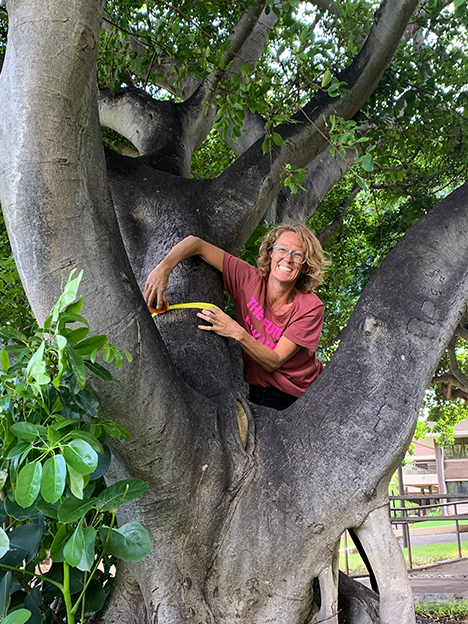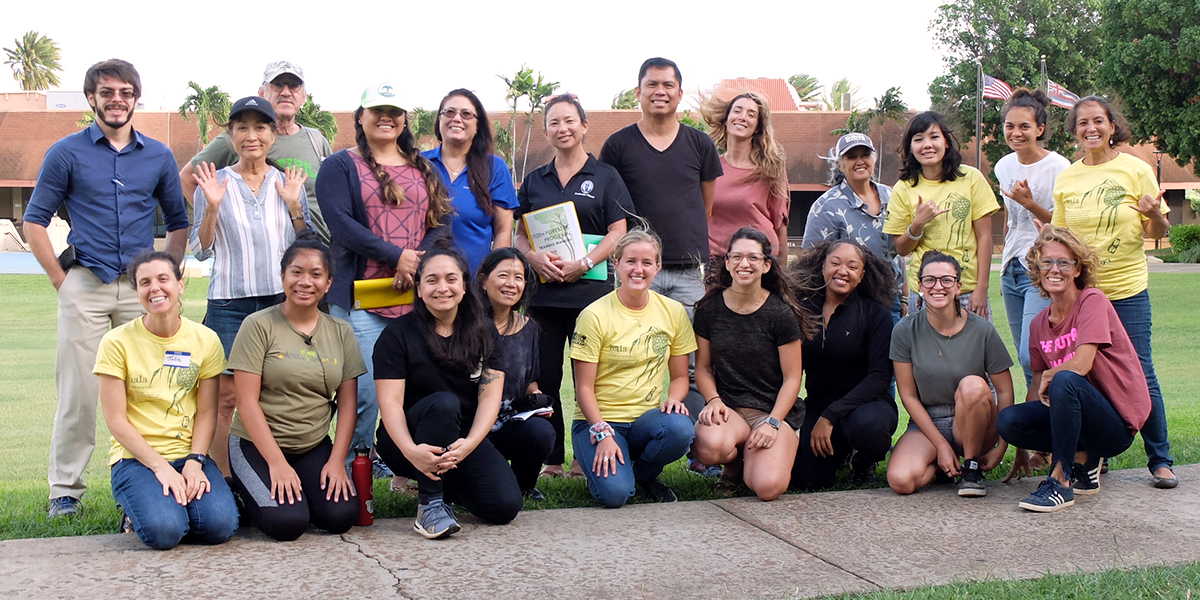In the face of impacts on our environment because of climate change, Kapiʻolani Community College is pushing to develop new leadership to tackle these issues. Kapi‘olani CC will use a $25,000 grant from Hawaiian Electric to establish a new program that will develop Resilience Corps Leaders (RCL), the next generation of sustainability and resilience professionals, educators and neighborhood residents who can integrate sustainability and resilience competencies into their careers and communities. The program will run from Oct. 1, 2021, to Jan. 1, 2023.
Robert Franco, director of Kapiʻolani CC’s Office for Institutional Effectiveness (OFIE), will oversee the development of RCL, who will integrate academic learning, personal growth and civic responsibility across their curriculum. The RCL will further tie into the college’s proposed partnership with the City and County of Honolulu to establish a Center for Resilient Neighborhoods (CERENE) to enhance community-based student learning through service learning, undergraduate research and internships focused on building resilience in O‘ahu neighborhoods and communities.
“Higher education around the world did not have time to plan for COVID and it slammed us all,” said Franco, who feels strongly that Kapiʻolani CC and the University of Hawai‘i must take the lead on sustainability.
“We have time, but not much, to plan for climate change. And like COVID, climate change does not care about borders and boundaries. We need to develop both interdisciplinary and intersectoral partnerships to build a productive future for our students and our neighborhoods.” —Robert Franco
“We recognize that training and personal emergency preparedness are critical to community resilience, but equally important are community engagement and awareness of the roles, risks and vulnerabilities of individuals, government, response agencies and businesses before, during and after a disaster,” added Kurt Tsue, Hawaiian Electric’s community affairs director.
“We believe Kapiʻolani Community College’s program to establish a resilience corps provides a sustainable path forward that will help communities across Oʻahu to be better prepared and able to rebound from any major disaster.” —Kurt Tsue
Initially, the grant will support 25 Kapiʻolani students as RCLs who will complete training provided by CERENE on community engagement as well as training by the National National Disaster Preparedness Training Center, a FEMA-based certified community resilience course. An additional 25 middle and high school students will serve as Resilience Advisors (RA). Once training is completed, RCL’s will be responsible for mentoring Kapʻiolani CC service learning and/or undergraduate research students to become Resilience Educators (RE). Together, the RCLs and REs will work with K-12 schools, local non-profits and neighborhood boards on resilience-related projects.
“Students will be supported to progress on the pathway from volunteer RA and RE positions to paid RCL positions over the duration of the program,” explained Franco. “Kapiʻolani faculty and staff in STEM and service learning programs will support the students, with coordination and evaluation by CERENE and its Advisory Board.”
CERENE will convene neighborhood-specific non-profits, public schools, government, emergency management and neighborhood board representatives to develop pandemic and disaster preparedness, response and recovery plans. The key objectives are to plan for and take action to mitigate the risks from hazards, increase the pace of recovery from destructive elements, adapt to changing environments, and integrate risk and community-based collaborative strategies into plans and programs. CERENE will serve the 55,000 residents in East Honolulu and the 440,000 residents in O‘ahu’s primary urban center.

About Kapʻiolani CC Service Learning
Service Learning (SL), by example, has successfully woven community engagement into course curriculum since 1995 and is proven to have increased student persistence and graduation rates. From 1995 to May 2019, nearly 15,000 of Kapi‘olani CC’s students contributed 325,000 hours to the community, averaging 21.7 hours per student. The college has been recognized by the Carnegie Foundation as a leader in campus-community engagement since 2006.
Kapi‘olani CC’s STEM program faculty and staff have also developed and sustained innovative undergraduate research experiences. As a result, the program received substantial funding from the National Science Foundation. Data reflects that since 2017, an average of 132 students per semester have conducted research; 54 students have presented their research at national conferences, programs or competitions; 385 peer mentoring sessions have been delivered per semester, and 54 community and career partnerships have been developed.
More recently, the college initiated a Citizen Foresters Group, a collaborative project with students serving as volunteer scientists who map and care for urban trees to add to a community’s tree inventory. Members of the group serve as ambassadors for Hawai‘i’s urban forests as they collect usable data on trees in public urban areas, such as parks and commercial and residential streets.
The college also assists in feeding the hungry through a campus-wide effort in food distribution. Because of its service learning presence at the Waikīkī Community Center, Kapi‘olani CC is able to receive perishable food from Hawai‘i Food Bank thus providing families with both perishable and non-perishable food items. Volunteer faculty, staff and students provide an organized front in receiving, bagging and distributing food items to the cars lined up in a queue for curbside pickup.
Questions? / More Information
If you would like to learn how you can support UH students and programs like this, please contact us at 808 376-7800 or send us a message.
